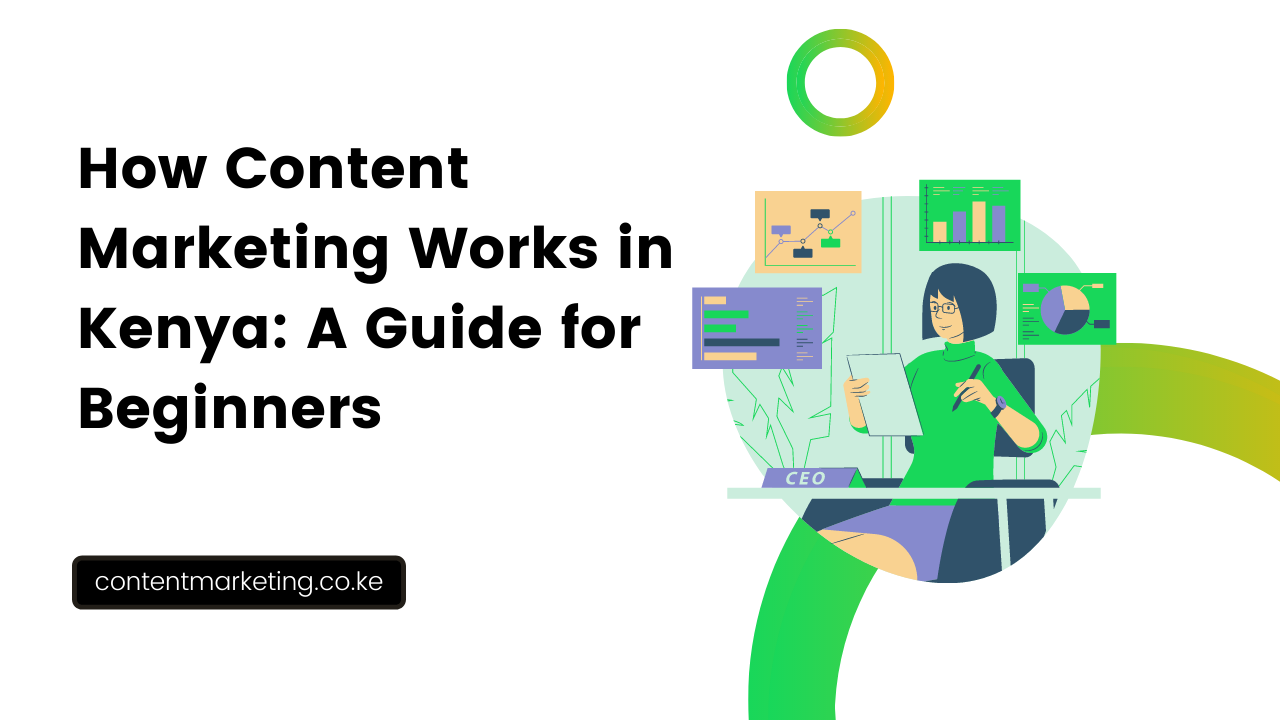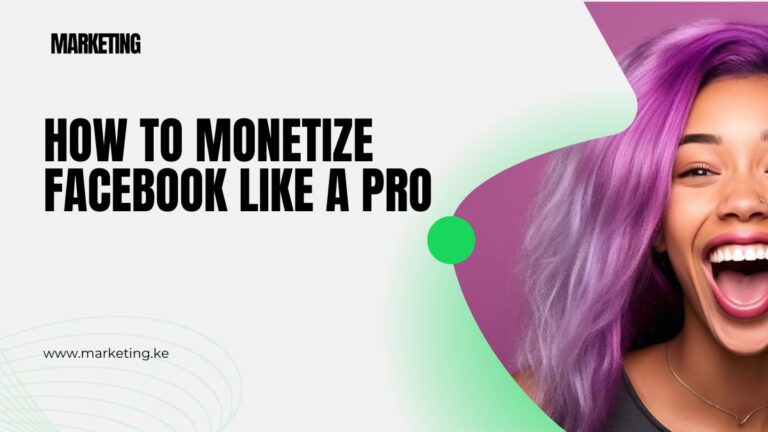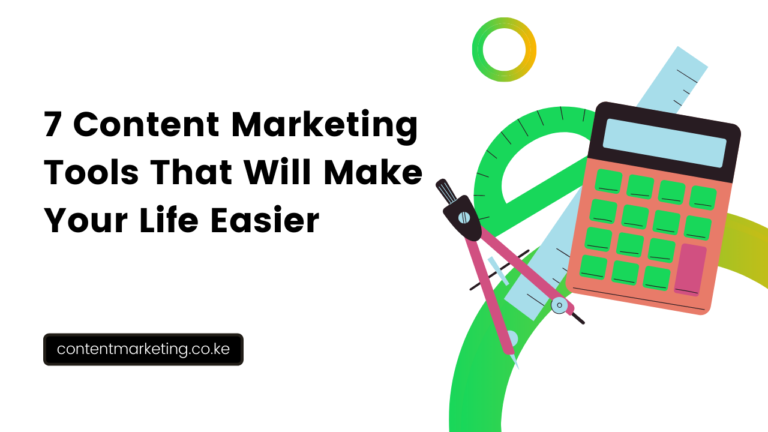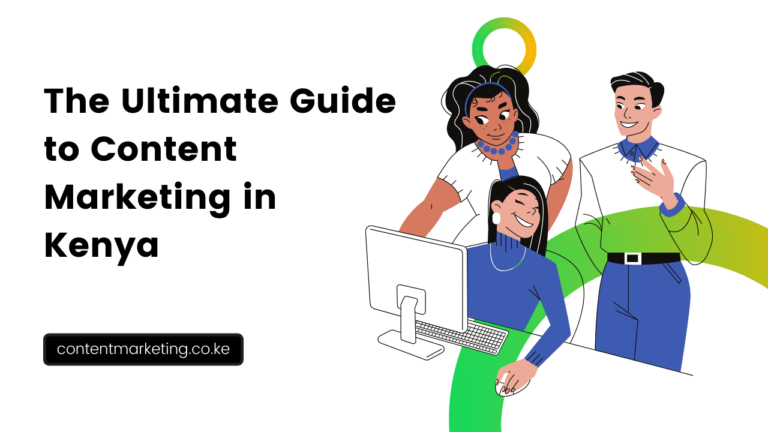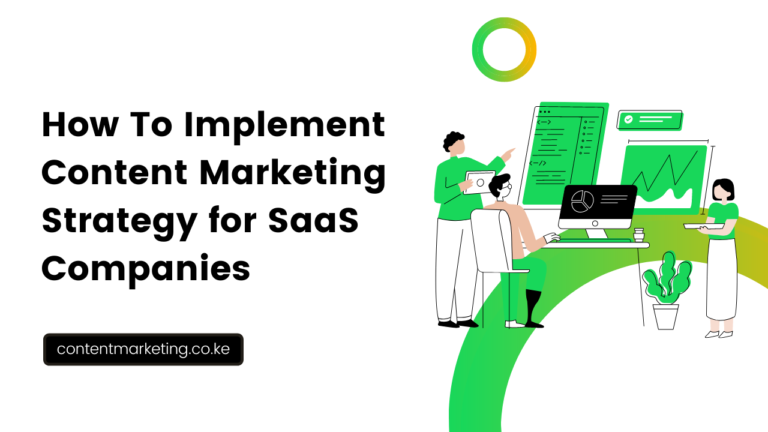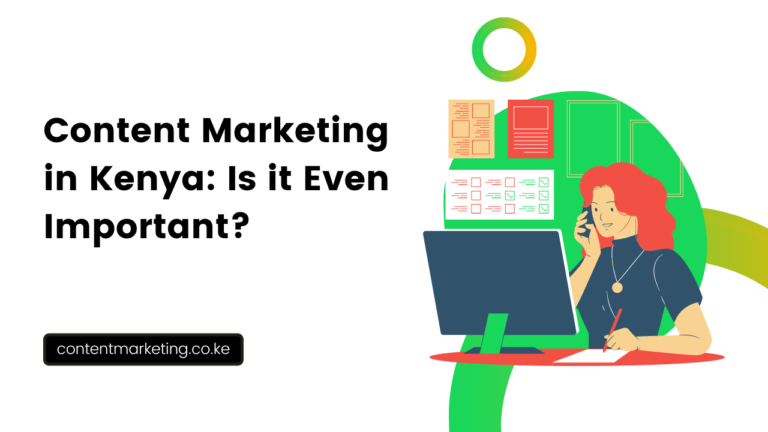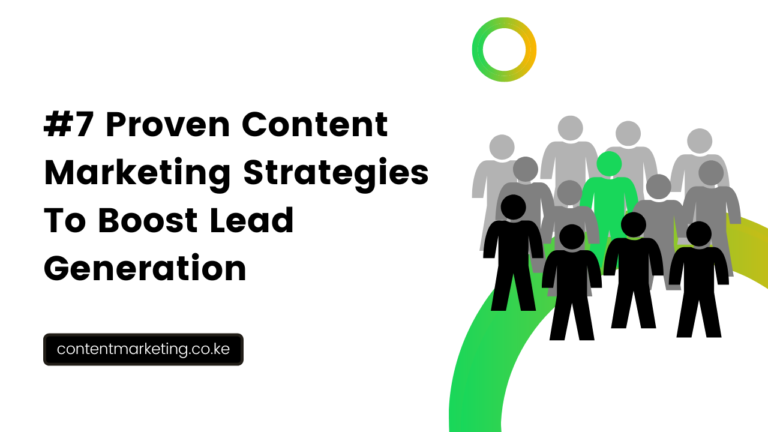How Content Marketing Works in Kenya: A Guide for Beginners
In today’s guide, we are looking at how content marketing works in Kenya.
see, Content marketing is a great way to increase traffic, leads, and sales.
One of the most common questions that business owners ask themselves is “What can I do to generate more leads?” Content marketing provides an answer to this question by providing free content (such as blog posts) for people who are interested in your product or service.
This will keep them engaged with you and ultimately help convert them into customers!
What is content marketing?
At its core, content marketing is the process of creating and sharing valuable free content with your target audience to help them achieve the desired goal.
This can include anything from blog posts and white papers to videos and infographics.
The main idea behind it is that by providing quality content that helps people in some way, you will eventually earn their trust and they’ll be more likely to do business with you.
How does it work?
You do this by providing them with valuable content that helps them in some way.
This could be anything from teaching them something new to solve a problem they’re experiencing.
As you continue to provide quality content, you’ll start to build trust with your audience. Once they trust you, they’ll be more likely to do business with you!
Why should I use it?
- It’s a great way to increase traffic and leads.
- It helps you stand out from the competition.
- It builds trust with your target audience.
- It’s a great way to educate people about your product or service.
It’s a cost-effective way to market your business in Kenya.
Types of content
a). Blog posts
Blog posts are a great way to share your thoughts and insights with your target audience. They’re also a great way to show off your knowledge and expertise on a particular topic.
Tips:
- Make sure your blog posts in Kenya are well written and easy to read.
- Include images, infographics, and videos to help break up the text and make it more engaging.
- Include a call to action at the end of your blog posts so people can learn more about your product or service.
b). White papers
White papers are long, in-depth documents that explain a particular topic in detail. They’re often used by businesses to educate their target audience about their product or service.
Tips:
- Your white paper should be factually correct and well researched. You don’t want to mislead your audience!
- Make sure you proofread the document carefully before publishing it online. Typos can undermine your credibility in a big way!
c). Case studies/testimonials
Case studies and testimonials are a great way to show off the success of your product or service.
They can help persuade people who are on the fence about doing business with you.
Tips:
- Make sure your case studies and testimonials are accurate and well written.
- Include images, videos, and graphs to help illustrate your point and make the content more engaging.
d). Infographics
Infographics are a great way to quickly communicate information in an entertaining and efficient manner.
They’re also one of the most shared types of content on social media (be sure to include share buttons below your infographics!)
Tips:
- Make sure you use quality images for your infographics.
- Include interesting and relevant facts and statistics to help make your point.
- Keep your infographic short and easy to read.
e). Videos
Videos are a great way to connect with your target audience on a personal level. They can also be a great way to show off your product or service in action.
Tips:
- The quality of your video is very important. Make sure to invest in a good camera and lighting before you start filming!
- Use videos as an opportunity to share your knowledge and expertise on a particular topic.
f). Podcasts/webinars
Podcasts and webinars in Kenya are great ways for people to learn more about your product or service on their own time.
This is especially useful for people who are interested in learning about what you have to offer but aren’t quite ready to make a purchasing decision.
Tips:
- Make sure the audio quality of your podcast/webinar is high so that it sounds professional and engaging.
- Include slides or images to help illustrate your point.
- Keep your webinars and podcasts short and sweet so people don’t get bored!
g). Social media posts
Social media posts in Kenya are a great way to connect with your target audience on a personal level. They can also be a great way to show off your product or service in action.
Tips:
- Make sure your social media posts are timely and relevant to what’s going on around you. For example, if there’s a big event happening at your company then use that as content for your post!
- Be relatable with the way you talk about yourself and your product/service so people can see you as a real person and not just an organization.
- Make sure the images and videos are high quality so your audience can easily understand what you’re trying to get across!
h). Ebooks/websites
Ebooks are digital versions of white papers or other types of content that can be downloaded by people on their own time.
Websites in Kenya are a great way to showcase your content in an easily-digestible format.
Tips:
- Make sure your ebook/website is easy to navigate and that the information is presented in a clear and concise manner.
- Include images, graphs, and videos to help break up the text and make your information more engaging.
- Include share buttons so people can easily spread your content with their network!
How does content marketing work? Your 6-step overview
Here is how content marketing in Kenya works;
1. You create valuable content
The first step in content marketing is to create valuable and engaging content that your audience will find helpful. This can be anything from an infographic or blog post, all the way up to a video or podcast!
As you create this content, remember who it’s for so you stay on topic throughout the whole process. For example: if you’re creating a video, make sure you know the target audience and what they’re interested in.
2. You share your content online
The next step is to share your content online in Kenya. This can be through social media, guest blogging on other websites, or even uploading it directly onto your own website!
It’s also important that you are consistent with the way you’re sharing this content so people know where to find it when they need it most. For example: if you upload your infographic onto your website, be sure to also share it with the relevant social media groups!
3. People search online for information about your business, products, and services
Once your content is shared online, people will find it. They might search on Google for more information about the topic you’re covering, or they may click on a link from another website that’s relevant to what you’ve created!
As this happens, make sure you have lead magnets in place that encourage them to sign up for your email list or download a white paper or e-book. This way you can continue to provide them with valuable content that they’ll appreciate!
4. People find and enjoy your helpful content
Once people start finding your content, it’s important that you continue to produce high-quality material so they don’t lose interest. If you can manage to keep their attention, they’ll eventually become customers!
Make sure you’re actively monitoring your website’s analytics so you can see what type of content is being viewed the most. This will help you better understand what your audience is looking for.
You can also reach out to influencers in the industry that are relevant to your business and ask them if they’d like to share some of your content with their own networks! This will help spread awareness about who you are as well as show people how helpful it is.
The best part about content marketing is that it’s a continuous process. You’re not done once you’ve created your content and published it online! You need to continue promoting it so people can find it, consume it, and hopefully become customers in the end.
5. You boost brand awareness and trust with your audience
As your audience consumes and shares your content, they’ll start to see you as an authority in the industry. This will help boost brand awareness and trust with your target market, which is essential for any business!
Make sure you’re active on social media so people can easily connect with you. You should also have a blog where you share your latest thoughts and ideas. This will show people that you’re constantly producing new content, which is a valuable asset.
Lastly, make sure your website is easy to navigate and that the information is presented in a clear and concise manner. Include images, graphs, and videos to help break up the text and make your information more engaging. Include share buttons on each page of your website so people can easily share what you’ve created with their friends and family.
This is a great way to grow awareness about who you are as well as help build trust with the public! It takes time for this kind of marketing strategy to work, but it’s definitely worth the wait in the end.
6. You earn more conversions and sales
The final result of content marketing in Kenya is that you earn more conversions and sales. This happens as people become more aware of your business, trust you more, and are finally ready to make a purchase!
Make sure you have a strong call to action on each page of your website so people know what they need to do next. You can also have a digital sales assistant who can help ease them through the purchasing process so they don’t have any questions or concerns.
The more your audience trusts you, the more likely they are to buy from you! Make sure you’re providing enough value for people’s money, and that you’ve earned their trust in the end by being transparent with everything.
Wrap
In conclusion, now that you know how content marketing works in Kenya, it is a great way to boost brand awareness, trust, and sales with your target market. It takes time and effort to produce high-quality content, but it’s definitely worth it in the end! Keep these tips in mind as you get started with your own content marketing strategy.
Keep these tips in mind as you get started with your own content marketing strategy!
- Produce high-quality content that’s helpful and informative
- Monitor website analytics to see what type of content is being viewed the most
- Reach out to influencers in your industry for help sharing your content
- Boost brand awareness and trust with your audience as they consume and share your material
- Earn more conversions and sales as your audience trusts you and is ready to make a purchase!
- Make sure you have clear calls to action on each page of your website
- Have an assistant who can help ease them through the purchasing process if needed.
- The more someone trusts you, the more likely they are to buy from you!
And that is how content marketing works in Kenya.

